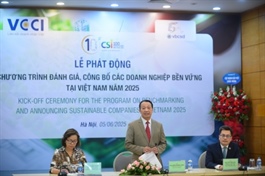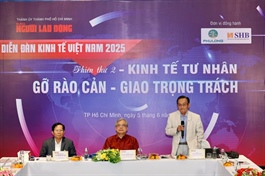Crackdown in store for bogus firms
Crackdown in store for bogus firms
Changes to the Law on Enterprises have been suggested to cover sanctions for different violations that would create a fairer business climate.
The National Assembly (NA) last week discussed the draft law amending and supplementing a number of articles of the Law on Enterprises 2020 (LoE).
Since the LoE 2020 was implemented, various violations on enterprise registration have been reported by authorised agencies both at the central and grassroots levels.
“Many enterprises have not operated at the addresses registered after being established,” stated the proposal. “They have failed to declare tax payment or only paid business licence tax. They have no collection or spending activities as normally found at an enterprise, such as paying corporate income tax, salaries, and social insurance, and they also have not issued or used registered invoices.”
There has been a growing situation that enterprises with a legal entity are established to violate the law and engage in money laundering, the proposal read.
According to the Ministry of Finance, experts have suggested that there must be more regulations on strengthening supervision and examination. There must also be regulations on specific sanctions for such violations, and also for businesses failing to contribute sufficient charter capital as pledged, and for those having bogus capital and falsely declaring charter capital.
Sanctions have also been proposed for those establishing bogus enterprises or hiding behind capital contribution; for those buying controlling shares of businesses to commit illegal acts; and for those appropriating money and assets through enterprise activities such as buying and selling invoices.
Many NA deputies said they strongly agree with the necessity to revise and supplement the LoE 2020 to remove obstructions in the practical performance of enterprises and in statement management over businesses. This is also aimed at carrying out Vietnam’s international commitments on preventing and combating money laundering.
However, they also underlined that in order to create a fairer and more transparent investment and business environment in Vietnam, more regulations must be devised for preventing violations.
Deputy Pham Van Hoa, representing the Mekong Delta province of Dong Thap said, “I suggest that those involved in tax-related violations such as evasion and tax debt must be banned from establishing and managing enterprises. This type of violation has been growing significantly, causing great losses to the state budget.”
With sophisticated tricks of concealing actual profits to evade taxes, using two accounting systems, these enterprises have been prosecuted in high numbers, Hoa continued. “Thus, it is necessary for strong punishments to be applied to this kind of violation to ensure good state budget collection, stabilise the investment and business climate, and help prevent other enterprises from violation,” Hoa said.
Deputy Nguyen Thi Yen Nhi, representing the Mekong Delta of Ben Tre, cited the LoE’s Article 17 as stipulating many kinds of organisations and individuals that do not have the right to establish and manage enterprises in Vietnam.
“However, I also suggest that those with tax debts or evading tax must be banned from establishing and managing enterprises. This will further demonstrate the strictness and clearness of the law to stabilise the domestic business and investment climate.”
Nhi further pointed out that under the draft law, false declaration of charter capital is understood an enterprise establishment being registered without sufficient capital being contributed, and changes made in registered charter capital as regulated.
“The addition of these provisions is reasonable. However, to ensure their effectiveness during the implementation process, it is necessary to add provisions on measures and sanctions strong enough to handle acts of falsely declaring charter capital, not contributing enough registered charter capital or intentionally valuing contributed assets at incorrect values,” Nhi suggested. “This aims to prevent fraud and ensure compliance with provisions of the law on tax administration.”
Meanwhile, deputy Tran Van Tien representing the northern province of Vinh Phuc wants to supplement some regulations on revocation of the certificate of enterprise registration (CER).
He cited Clause 1 of Article 212 under the LoE 2020 as stating that an enterprise’s CER shall be revoked if the enterprise stops performance within one year without notifying the business registration agency and the tax agency.
“However, there is currently no regulation on the basis for the business registration agency to determine that an enterprise has stopped operations for more than one year. Therefore, it is not eligible to revoke the CER according to the above regulations,” Tien said.
To facilitate the process of post-auditing enterprises, it is proposed that the regulation at Point c of Clause 1 be amended. “The authorised agency shall revoke the CER upon receiving a notice from an enterprise that has not operated at the registered address for more than one year, and requesting the revocation of the CER of enterprises,” Tien suggested.
The draft law is scheduled to be adopted on June 17 and take effect on October 1.
- 09:45 09/06/2025



























